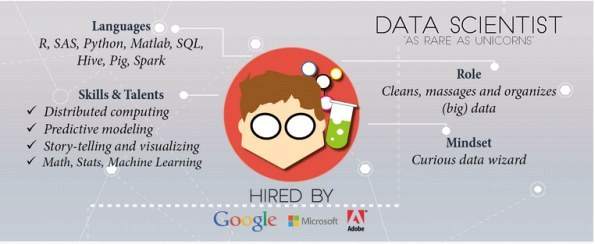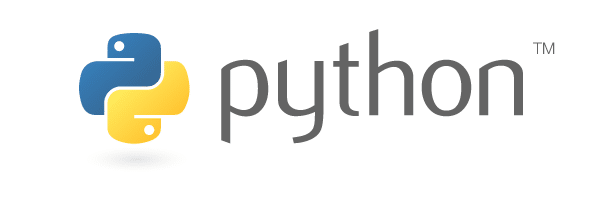It’s the buzz!
Everyone is talking about data science as the dream job that they want to have!
Yes, the “100K $USD annual package” is a big draw.
Furthermore, the key focus of self-help and self-improvement literature coming out in the last decade speak about doing what you enjoy and care about – in short, a job you love to do – since there is the greatest possibility that you will shine the brightest in those areas.
Hence many students and many adventurous challenge-hunting individuals from other professions and other (sometimes related) roles are seeking jobs that involve problem-solving. Data science is one solution since it offers both the chance to disrupt a company’s net worth and profits for the better by focusing on analytics from the data they already have as well as solving problems that are challenging and interesting. Especially for the math nerds and computer geeks with experience in problem-solving and a passionate thirst to solve their next big challenge.
So what can you do to land yourself in this dream role?
Fundamentals of Data Science
Data science comprises of several roles. Some involve data wrangling. Some involve heavy coding expertise. And all of them involve expert communication and presentation skills. If you focus on just one of these three aspects, you’re already putting yourself at a disadvantage. What you need is to follow your own passion. And then integrate it into your profession. That way you earn a high amount while still doing work you love to do, even at the level of going above and beyond all the expectations that your employer has of you. So if you’re reading this article, I assume that you are either a student who is intrigued by data science or a working professional who is looking for a more lucrative profession. In such a case, you need to understand what the industry is looking for.

From http://news.mit.edu/2018/mitx-micromasters-program-statistics-and-data-science
a) Coding Expertise
If you want to land a job in the IT or data science fields, understand that you will have to deal with code. Usually, that code will already have been written by some other people or company in the first place. So being intimate with programming and readiness to spend hours and hours of your life sitting before a computer and writing code is something you have to get used to. The younger you start, the better. Children pick up coding fastest compared to all other age groups so there is a very real use-case for getting your kids to code and to see if they seem to like it as young as possible. And there is not just coding – the best choices in these cases will involve people who know software engineering basics and even source control tools and platforms (like Git and GitHub) and have already started their career in coding by contributing to open source projects.
If you are a student, and you want to know what all the hype is about, I suggest that you visit a site that teaches programming – preferably in Python – and start developing your own projects and apps. Yes – apps. The IT world is now mobile, and anyone without knowledge of how to build a mobile app for his product will be left in the dust as far as the highest level of earning is concerned. Even deep learning frameworks, that were once academic, have migrated to the mobile and app ecosystem. That was unthinkable a mere five years ago. If you already know the basics of programming, then learn source control (Git), and how to build programs for open source projects. And then contribute to those projects while you’re still a student. In this case, you will actually become an individual that companies go hunting for before you even complete your schooling or college education. Instead of the other way around!
Mentoring
If you are a student or a professional who is interested in this domain, but don’t know where to start – well – the best thing to do is to find a mentor. You can define a mentor or a coach as someone who has achieved what you aim to achieve in your life. You learn from their experience, their networking capabilities, and their tough sides – the way to keep up your ambition and motivation when you feel the least motivated. If you want to learn data science, what better way than to learn from someone who has done that already? And you will gain a lot of traction when you show promise, especially on your networking side for job placement. For more on that topic (mentoring) – I highly recommend that you study the following article:
https://dimensionless.in/how-to-find-mentors-for-data-science/
b) Cogent Communication (Writing and Speaking skills)
Even if you have the world’s best programming expertise, ACM awards, Mathematics Olympiad winning background, you name it – even if you are the best data scientist available in the industry today for your domain – you will go nowhere without communication skills. Communication is more than speaking, reading and typing English – it is the way you present yourself to others in the digital world. That is why blogging, content creation, and focused interaction with your target industry – say, on StackOverflow.com – are so important. A blog really resonates with those to whom you seek a job. It shows that you have genuine, original knowledge about your industry. And if your blog receives critical acclaim through several incoming links from the industry, expect a job interview offer in your email before too long. In many countries but especially in India, the market is flooded with graduates, postgraduates, and PhDs who might have top marks on paper but have no marketable skills as far as their job requirements demand.

Overcome your fears!
Right now it is difficult to see the difference between a 100th percentile skilled data scientist and a 30th percentile skill level by just looking at documents that you submit to a company. A blog testifies that you know your field authoritatively. It also means that you have gained attention from industry leaders (when you receive comments). A StackOverflow answer that is highly rated or even a mention in technology sites like GitHub indicate that you are an expert in your field. Communication is so critical that I recommend that you try to make the best use of every chance you get to speak in public. This is the window the world has on you. Make yourself heard. Be original. Be creative. And the best data scientist in the world will go nowhere unless he or she knows how to communicate effectively. In the industry, this capacity is known as soft skills. And it can be your single biggest advantage over the competition. If you are planning to join a training course for your dream job, make sure the syllabus covers it!
c) Social Networking and Building Industry Connections through LinkedIn
Many sources of information don’t focus on this issue, but it is an absolute must. Your next job could be waiting for you on LinkedIn through a connection. Studies show that less than 1% of resume submissions are selected for the final job offer and lucrative placement. But the same studies show that at least 30% of internal referrals from within a company get placed into the job of their dreams. Networking is important – so important that if you know the job you’re after, please reach out and research. Understand the company’s problems. Try to address some of their key issues. The more focused, you are the more likely it is that you will get placed in the company you aim for. But always have a plan B – a fallback system, so that in case you do not get placed, you will know what to do. This is especially important today with the competition being so intense.

The Facebook of the Workplace
One place where you can be noticed is through industry connections in social networks. You might miss this, even if you are an M.S. from a college in the US. LinkedIn profiles – the Facebook of the technology world – are especially important today. More and more, in an environment saturated with high-quality talent, who you know can sometimes be even more important as what you know. Connecting to professionals in the industry you plan to work in is critical. This can occur through meetups, through conferences, through technological symposiums and even through paid courses. Courses who have instructors with industry connections are worth their weight in gold – even platinum. Students of such courses who show outstanding promises will be directed to their industry leaders early. If you have a decent GitHub profile but don’t know where to go after that, one way is to go for a course with industry experienced experts. These are the people who are the most likely to be able to land you a job in such a competitive environment. Because the market for data scientists – in fact for IT professionals in general – is highly saturated, including locations like the US.
Conclusion
We have not covered all topics required on this issue, there is much more to speak about. You need to know Statistics – even at PhD levels sometimes, especially Inferential Statistics, Bayes Theorem, Probability and Analysis of Experiments. You should know Linear Algebra in-depth. Indeed, there is a lot to cover. But the best place to learn can be courses tailored to produce Data Scientists. Some firms have really gone the extra mile to convert industry knowledge and key results in each subtopic to create noteworthy training courses specially designed for data science students. In the end, no college degree alone will land you a dream job. What will land you a dream job is hard work and experience through internships and industry projects. Some courses like the ones offered by www.Dimensionless.in have resulted in stellar placement and guidance even after the course duration is finished and when you are a working professional in the job of your dreams. These courses offer –
- Individual GitHub Profile Creation & Mentoring (Coding Expertise)
- Training in Soft Skills
- Networking Connections on LinkedIn
- Instructors with Industry Experience (not academic professors!)
It’s a simple yet potent formula to land you the job of your dreams. Compare the normal route to a data science dream job – a PhD from the US (starting cost Rs. 1,40,28,000.00 INR for five years total, as a usual range) – to a simple course at Rs. 50K to Rs. 25K (yes, INR) from the comfort of taking the course from wherever you may be in the world (remote but live tuition – not recorded videos) with a mic on your end to ask the instructor every doubt you have – and you have a remarkable product guaranteed to land you a dream job within six months. Think the offer’s too good to be true? Well; visit the link below, and pay special attention to the feedback from past students of these same courses on the home page.
Last words – you never know what the future holds – economy and convenience are both prudent and praiseworthy. All the best!


